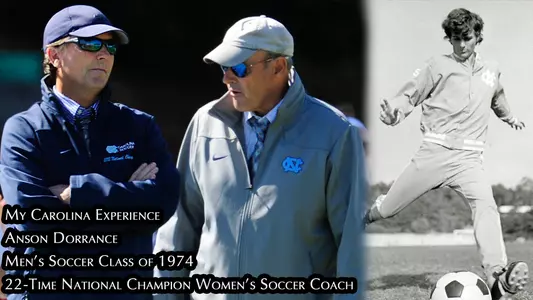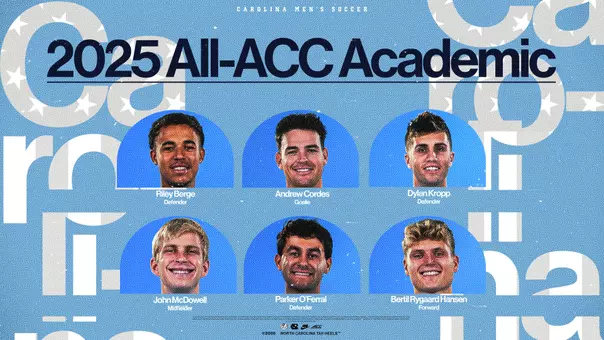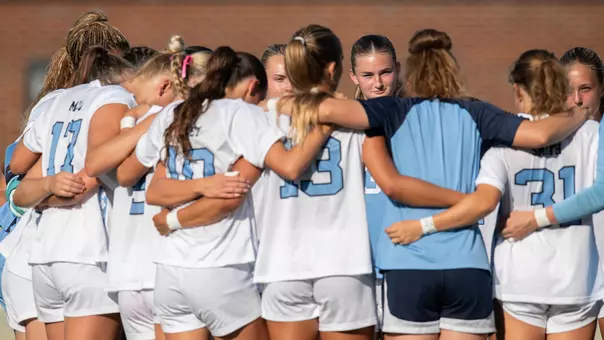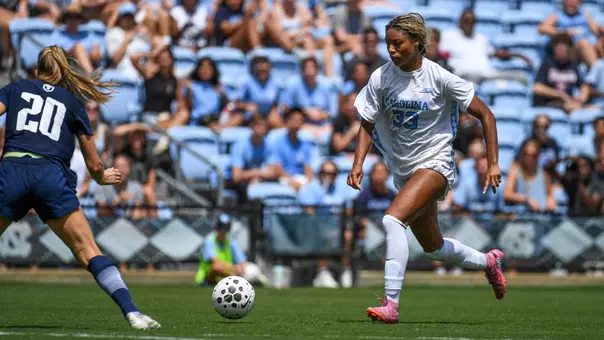University of North Carolina Athletics

My Carolina Experience: Anson Dorrance
December 31, 2014 | Men's Soccer, Women's Soccer
My Carolina Experience: Anson Dorrance
By Zoya Johnson, GoHeels.com
Editor's Note: We end our first year of My Carolina Experience articles with a New Year's Eve feature on Tar Heel women's soccer head coach Anson Dorrance, UNC Class of 1974. Dorrance was an All-ACC player as an undergraduate, coached the Tar Heel men's team from 1977-88 and has been the record-setting head coach of the Carolina women's soccer program since 1979. Happy New Year to all Tar Heels!
With a story like Anson Dorrance's, one would venture to speculate that he was fashioned into human form by the Soccer Gods themselves. The reality is, this legend was molded by experience, led by passion, and has been sustained through utter determination.
Dorrance grew up the son of an international oil businessman. His early years spent in Europe, Africa and parts of Asia exposed him to many sports and if he could have, Dorrance would have played them all. “I originally went to St. Mary's in San Antonio, Texas and I think I had a shot to be in their top eight in tennis but certainly wasn't going to be in their top six so soccer was my only varsity level choice.”
After one semester in Texas, Dorrance transferred to UNC and walked onto the men's soccer team under coach Marvin Allen. His natural soccer savvy and talent would lead to him being named to the All-ACC Team three times as an undergraduate and eventually to be named one of the Top 50 men's soccer players in the ACC's history. Despite his success while at Carolina, soccer was only a small piece of Dorrance's experience.
“When I came to Carolina there was this incredible intramural program on campus that all the dorms and frats seemed to be into and I jumped in with both feet. The dorm I was in, Teague, was an active member of the intramural program so Danny Newcomb, the intramural sports manager, asked me which sport I'd be interested in. There wasn't a sport that I thought I could win so I told him to put me down on every team, which sort of shocked him.” That initial shock quickly turned into awe when Newcomb and everyone involved in intramurals saw that he was in fact phenomenal at everything he did.
Dorrance's talent sparked the beginning of Teague's dominance over the intramural sport world for years, and when he wasn't competing in something, at practice, or in class he made it a point to see performances in Memorial Hall and listen to any speaker who came to campus.
“Carolina was just incredibly enriching, so for me trying to sell my college soccer players on being a part of the rich experience that I had is very important.”
After graduating from Carolina, Dorrance sought a law degree. He started out at North Carolina Central University but transferred to UNC as soon as he was able, as he had been offered an assistant coaching position with Carolina's men under Allen.
“I had no real soccer resume. In fact, my soccer resume before being extended the chance to coach here was coaching in the local coeducational recreational soccer league, Rainbow Soccer. So I tell this story to my colleagues all the time that I went from Rainbow Soccer to the top of Division I, which is an absolutely absurd ascension in the coaching profession. But I ended up really enjoying it.”
Though Dorrance had found a calling as a coach he was torn between which profession he would find most fulfilling. It was clear he could be a success practicing law. It was also evident he had a gift for mentoring. In order to balance coaching and school he took a course shy each semester, allowing him to be on track to finish his law degree in four years. “In my fourth year of law school, as I was finishing they made the men's coaching position full time for the first time with the women's team added on starting in 1979. I was trying to coach two teams and finish the law degree and it was overwhelming so I dropped out of law school and just started coaching and absolutely loved it.”
After three years with the men (one as an assistant and two as head coach), Dorrance coached both the men and women from 1979 until 1988 when he made the decision to hand over the men's team to his chief assistant, Elmar Bolowich.
Within two years of coaching on the women's side the team had secured the national title under the aegis of the Association for Intercollegiate Athletics for Women, but Dorrance sought more.
In 1981-82, the NCAA began a process of taking over administration of women's sports on the collegiate level. Soccer was not included in the initial year so the Tar Heels played for and won the AIAW crown. The tranisition in collegiate women's sports from the AIAW to NCAA era was coming fast and furious.
Heading into 1982, the NCAA had not yet set up a women's soccer championship so he and the head coach at Colorado College led the charge for the NCAA to make the case for change. Just a few months later, North Carolina won the first ever NCAA championship in the sport.
Carolina has gone on to win 20 more NCAA titles, the latest in 2012. Altogether, UNC has won 22 national titles in the sport in the 34 tournaments held since 1981. No other school has won more than three (Notre Dame).
That record is built on Dorrance's notion that he and his team would always fight to hold on to their leadership role. “I loved pioneering the sport, helping guide its growth and then seeing it just take off. We were very aggressive coming out of the gate. I thought by being the first varsity in the South we'd be in a great position nationally, and once we were in that position the aim was to try and sustain it as long as we could.”
Dorrance believes the maintenance of his team's standing as a national force is due greatly to the fact they have established a culture that the girls essentially live. No rules need to be set because they are constantly and consciously aware of the squad's core values. Those core values have continued to be not only a driving factor in the women's success and growth on the field, but off it as well. The constant striving for excellence that is nurtured throughout the Carolina soccer roster turns into something bigger than themselves and continues into the players' lives after college.
“The thing that we've done within our team is create a player development platform that is separate from everyone else. There are books about the things we do because it's unique, and so what we try to sell the recruits is that we do stuff differently than everyone else and our stuff works.
“We've put more players on the U.S. full national team and the U.S. Olympic team than any other program by a wide margin. If a kid comes here we're going to do something that's unique from an academic perspective also. In the last three years we have had three players admitted to the Harvard Business School and I'd be hard-pressed to find too many soccer programs in the country doing that.”
At the same time, Dorrance also nurtures an environment where his players have opportunities to pursue the pro game. All six seniors on the 2013 team went on to play professional soccer this year and 2014 senior captain Satara Murray just signed a pro contract with Liverpool FC in England.
A big part of Dorrance's allegiance to the University is everything he feels he has gained through his experience. The mounting pressures of social media and the attention it takes away from experiencing life in real time presents today's Tar Heels with a danger of losing not only a chance to experience their university to the fullest, but of becoming the people are truly meant to be.
“I would promise anyone that is capable of spending their time constructing themselves as scholars, as people that are involved, and as athletes that you're going to graduate as someone the whole world is interested in. That's the way to get the best education.”
Thus, Dorrance tasks every new student with this, “Pour yourself into the university. You'll graduate a very rich cultured, educated, individual with core values who's going lead a very productive life and leave every community you depart from better than when you entered it. Go to every speech you can attend on campus, go to every performance in Memorial Hall that you can, and develop yourself spiritually because, ultimately its things like these that will impact all aspects of your life in the most positive way.”
“The thing I've learned about this place is we are unique. There aren't too many places that have the enriching opportunities in the arts that we do here. I also don't think there are too many places that have a college town like Chapel Hill. I just think this is an incredibly special place and all of us that have gone here know this. I'm very proud to be a son of the University of North Carolina.”








